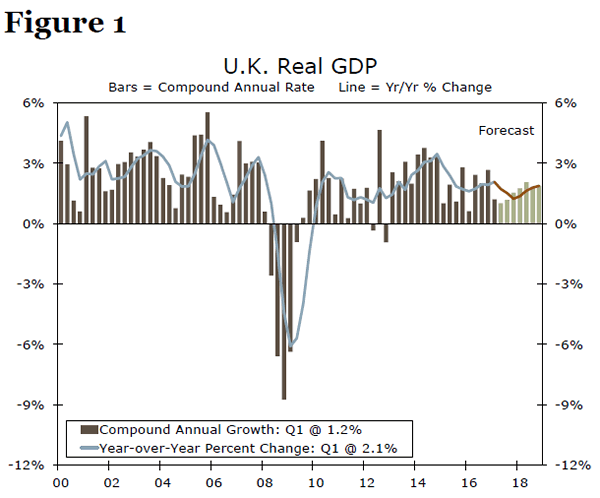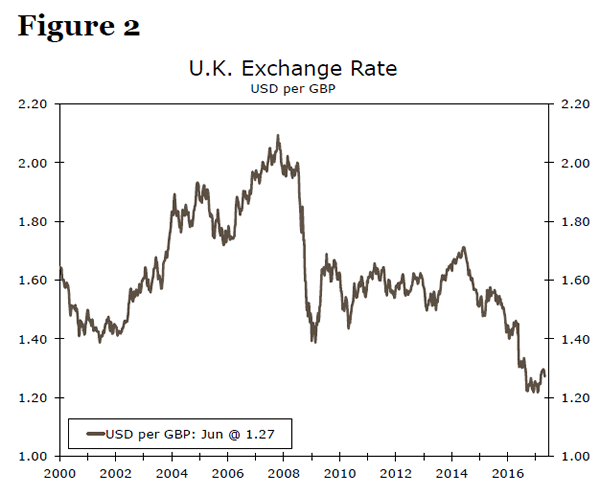What Happens When Your Gamble Doesn’t Pay Off?
On April 8, British Prime Minister Theresa May announced that she was calling a snap parliamentary election to be held on Thursday, June 8. At the time, the Conservative Party was riding high in the polls and Jeremy Corbyn, the leader of the Labour Party, was not seen by many as a very effective leader. May had hoped to increase her parliamentary majority – the Tories held 330 seats in the 650 seat House of Commons – which she reasoned would increase her bargaining strength heading into the upcoming Brexit negotiations with the European Union (EU).
May’s gamble has failed spectacularly as the Conservative Party appears to have won only 318 seats in yesterday’s election, which means it is 8 seats short of an absolute majority. So what happens now? The Conservatives will try to form a new government. One option is to seek out a coalition partner or partners that would produce a majority in parliament. In a statement after the election, May indicated her plans to form a coalition government with the Democratic Unionist Party (DUP). Under this arrangement the DUP, or any other minority member of the coalition, may get a few seats in the cabinet. Another option would be a "confidence-and-supply" deal. Under this arrangement there would be no formal coalition, but one or more parties might agree to support the Conservatives on major pieces of legislation such as the budget. By its very nature, however, such an arrangement tends to be unstable. If the Tories cannot find a coalition partner and no parties are willing to work with it on a "confidence-and-supply" arrangement, then the Labour Party would be given a turn to try to form the next government.
Theresa May’s future as the prime minister of the United Kingdom is tenuous. Even if the Tories stay in power, May’s failed gamble has weakened her position as the leader of the Conservative Party. Some of her rivals in the Conservative Party could challenge her for party leadership in coming weeks. In addition, Britain’s bargaining position in the upcoming Brexit negotiations visà- vis the EU has been weakened. Some policymakers in EU countries could view the election results as an indication that British voters are starting to regret their decision in last year’s Brexit referendum to leave the EU.
Does Political Uncertainty Have Economic & Financial Consequences?
As implied above, the United Kingdom now faces a period of political uncertainty. Not only has the election produced some political precariousness, but it has also raised the uncertainty that is inherent in the upcoming Brexit negotiations. Speaking of Brexit, some analysts thought last summer that the uncertainty associated with Brexit could lead to a mild U.K. recession in late 2016/early 2017. In any event, real GDP growth in the United Kingdom held up well through the end of 2016 (Figure 1). However, real GDP grew only 0.3 percent (1.2 percent annualized) on a sequential basis in Q1-2017, and incoming monthly data suggest that the pace of economic activity thus far in the second quarter has remained slow. In our view, the election results are not likely to have meaningful effects on the British economy in the foreseeable future, and we are not inclined to make significant changes to our economic forecast at this time. In that regard, we forecast that real GDP growth in the United Kingdom will slip from 1.8 percent last year to 1.5 percent in 2017 before edging back up to 1.7 percent next year.

In terms of financial variables, the major fallout thus far appears to be largely confined to the exchange rate. Prices of British government bonds are little changed in the immediate aftermath of the election news, and the U.K. stock market appears to be unfazed. The British pound nosedived nearly 2 percent when the initial election results were released at 10:00 PM BST, and it remains on the ropes as of this writing. However, the reaction of sterling to the election news pales in comparison to the nosedive it suffered last summer in the immediate aftermath of the Brexit referendum. Indeed, the pound plummeted 8 percent on balance against the U.S. dollar on the day following last year’s referendum.
Looking forward, we expect that sterling will depreciate mildly against the greenback over the next few quarters. That said, we forecast that the dollar will strengthen modestly vis-à-vis most currencies in the near term as the Federal Reserve continues to tighten policy while most other major central banks continue to maintain accommodative policy stances. In other words, the election has not really caused us to rethink our views regarding our forecast for the value of sterling against other major currencies.

After political uncertainty in the United Kingdom starts to dissipate, there is the chance that sterling depreciation could eventually be reversed. If the election results produce an outcome that reduces the probability of "hard" Brexit (i.e., the United Kingdom decides to give up full access to the EU single market in order to have more sovereignty over its trade and immigration policies) sterling could recover. Everything else equal "hard" Brexit would increase uncertainty because it would imply more adjustment of the British economy from the status quo. "Soft" Brexit, in which only modest changes to trade and immigration policies would be required, would imply less adjustment vis-à-vis the status quo. Stay tuned.
